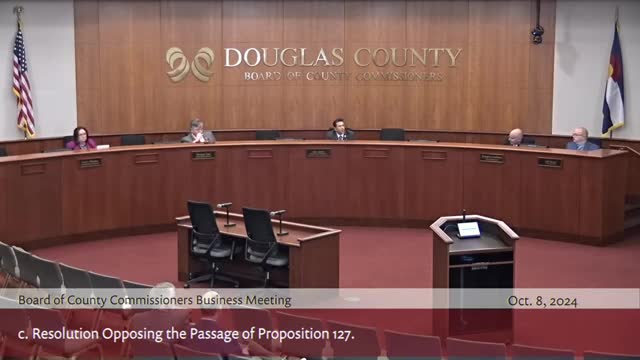County Commissioners Unite Against Controversial Hunting Initiative
October 08, 2024 | Douglas County, Colorado
This article was created by AI summarizing key points discussed. AI makes mistakes, so for full details and context, please refer to the video of the full meeting. Please report any errors so we can fix them. Report an error »

In a recent meeting, the Douglas County Board of Commissioners unanimously expressed their opposition to Proposition 127, an initiative aimed at prohibiting the hunting of mountain lions, bobcats, and lynx in Colorado. The resolution, introduced by Commissioner Thomas, emphasizes the potential negative impact of the proposition on the state's wildlife management practices.
John Swerdout, a seasoned wildlife management professional with over 35 years of experience, presented the resolution. He argued that the initiative would undermine the authority of Colorado Parks and Wildlife (CPW), which has effectively managed wildlife populations through regulated hunting. Swerdout highlighted that both mountain lions and bobcats currently have stable populations, and banning their hunting could lead to overpopulation, threatening other species and disrupting the ecological balance.
The resolution outlines that Proposition 127 would not only redefine trophy hunting but also impose stricter penalties, including class 1 misdemeanor charges for violations. Swerdout warned that the measure could force CPW to overhaul its management strategies, potentially causing more harm than good.
Commissioner Thomas reinforced the need for science-based wildlife management, cautioning against \"biology at the ballot box.\" He referenced ongoing issues with wolf populations in other counties, suggesting that the state should address existing wildlife management challenges before introducing new regulations.
The board's resolution also noted the financial implications of hunting fees, which contribute to state parks and conservation efforts. The commissioners urged local citizens to vote against Proposition 127 in the upcoming November 2024 election, emphasizing the importance of maintaining effective wildlife management practices that have been developed over decades.
The meeting concluded with citizen testimonies supporting the resolution, with many expressing concerns about the implications of outside influences on Colorado's wildlife policies. The board's stance reflects a commitment to preserving the state's wildlife management authority and ensuring that decisions are based on scientific evidence rather than popular sentiment.
John Swerdout, a seasoned wildlife management professional with over 35 years of experience, presented the resolution. He argued that the initiative would undermine the authority of Colorado Parks and Wildlife (CPW), which has effectively managed wildlife populations through regulated hunting. Swerdout highlighted that both mountain lions and bobcats currently have stable populations, and banning their hunting could lead to overpopulation, threatening other species and disrupting the ecological balance.
The resolution outlines that Proposition 127 would not only redefine trophy hunting but also impose stricter penalties, including class 1 misdemeanor charges for violations. Swerdout warned that the measure could force CPW to overhaul its management strategies, potentially causing more harm than good.
Commissioner Thomas reinforced the need for science-based wildlife management, cautioning against \"biology at the ballot box.\" He referenced ongoing issues with wolf populations in other counties, suggesting that the state should address existing wildlife management challenges before introducing new regulations.
The board's resolution also noted the financial implications of hunting fees, which contribute to state parks and conservation efforts. The commissioners urged local citizens to vote against Proposition 127 in the upcoming November 2024 election, emphasizing the importance of maintaining effective wildlife management practices that have been developed over decades.
The meeting concluded with citizen testimonies supporting the resolution, with many expressing concerns about the implications of outside influences on Colorado's wildlife policies. The board's stance reflects a commitment to preserving the state's wildlife management authority and ensuring that decisions are based on scientific evidence rather than popular sentiment.
View full meeting
This article is based on a recent meeting—watch the full video and explore the complete transcript for deeper insights into the discussion.
View full meeting
